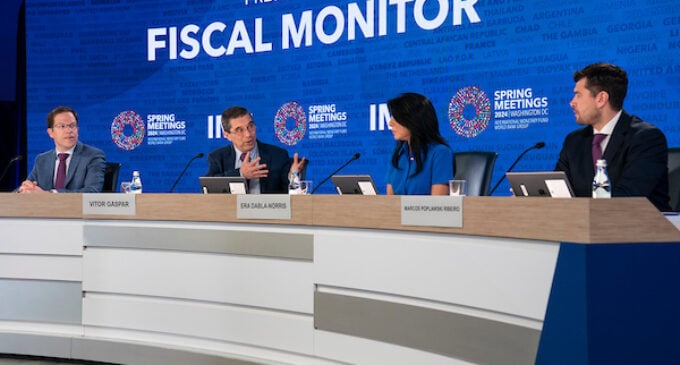Debt servicing gulps 56% of Nigeria’s tax revenue, says IMF


The International Monetary Fund (IMF) is concerned about “heavy” debt-service burdens in low-income countries — stating that debt servicing in Nigeria gulps 56 percent of tax revenue.
The Bretton Woods firm disclosed this in its Fiscal Policy Monitor report unveiled during a press briefing in Washington DC at the IMF/World Bank annual meetings.
According to the organisation, large shares of loans on concessional terms, high inflation, and resulting favourable interest-growth differentials have helped contain average public-debt-to-gross domestic product (GDP) ratios in low-income developing countries, ”at around 50 percent of GDP since 2020, on average”.
An exception, the IMF said, was an uptick to 53 percent of GDP in 2023, largely driven by exchange rate depreciation in Nigeria.
“However, countries are carrying heavy debt-service burdens, amounting to 13 percent of total spending and almost 25 percent of tax revenues, on average, in 2023 (about double the level 15 years ago). In Nigeria, the debt-service burden amounts to around 56 percent of tax revenues,” the IMF report said.
The lender said such high debt servicing costs prevent low-income developing countries from spending more on essential services and critical investments to improve economic resilience and reduce poverty.
The institution said low-income economies are also borrowing increasingly on commercial terms, amplifying their exposure to interest rate and foreign exchange risks.
“Accordingly, risks associated with debt refinancing are high, as repayments of substantial amounts of external debt — about $60 billion — are coming due in 2024–25, three times the average in the 2010s (Holland and Pazarbasioglu 2024),” the firm said.
“Several low-income developing countries returned to international markets after a hiatus in early 2024 (Benin, Côte d’Ivoire, Kenya), allowing them to refinance maturing debt.
“However, at present, governments should carefully consider the trade-offs between current financing and future fiscal sustainability associated with issuing public debt at high costs.”
Meanwhile, the Bretton Woods institution said primary deficits are projected to decline further in low-income developing countries in 2024 to 1.5 percent of the gross domestic product (GDP), on average, gradually falling to 1 percent by 2029 – “about 1.3 percentage point of GDP below their level in 2019”.
Primary deficits measure a country’s fiscal situation by examining the difference between government revenues and spending, excluding interest payments.
The IMF, however, said revenues are expected to improve in many economies in the low-income group, “given, among other measures, new tax measures and reduced exemptions to the value-added tax”.
The firm said expenditures are also expected to rise modestly.

















There are no comments at the moment, do you want to add one?
Write a comment